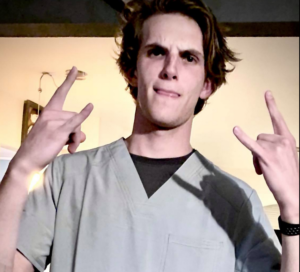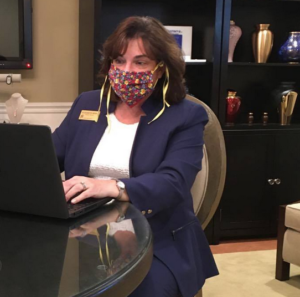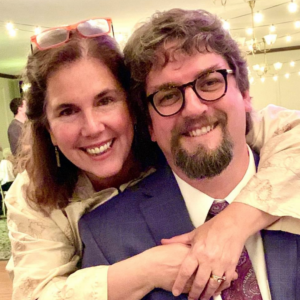One family’s experience working the pandemic.
Watching my 21-year-old getting ready to go off to work at an area hospital emergency department as the pandemic reached Utah, I was struck by the contrasting emotions of pride and fear. So many years of keeping him safe, only now to send him into a workplace requiring so much protection and so many precautions worried me. Then I thought of how many of my immediate family members were not part of the “safer at home” set but, rather, were donning masks to care for those affected one way or another by what’s out there. Here is a little scrapbook of what’s up in the Plummer/Mottonen family in these days of Pandemonium.

Just starting his medical career, my son Miles began working in an area hospital emergency department.
He began just in time to learn all about being fitted for various COVID-ready gear. Much scrubbing before and after, the shoes stay out of the house and he showers before and after work with a fresh set of clothes to change into before he comes home. Keeping the high risk members of our family safe is of utmost importance to him.
Miles’ ongoing work with Skaggs Physical therapy at the U of U has changed as the entire population of clients there is considered high risk and all care is now being done over the phone, just checking in to see what help the clients with neurological disabilities might need. This work combined with his time volunteering at the two area free clinics will serve Miles well in his future. He applies to PA schools this summer.
 My sister Elizabeth is a funeral director in Ohio. She is quite literally a “last responder” in this crisis. She is well known for her beautiful family tributes and glorious send offs. The pandemic has greatly modified her work as public assembly is no longer possible. “Normally I would be meeting with families at this table but the way it is now, we do our meetings via Microsoft Teams so I just sit at my computer. I never dreamed I’d be making arrangements in this way.” Drive-by services with sufficient distancing between vehicles graveside are allowed.
My sister Elizabeth is a funeral director in Ohio. She is quite literally a “last responder” in this crisis. She is well known for her beautiful family tributes and glorious send offs. The pandemic has greatly modified her work as public assembly is no longer possible. “Normally I would be meeting with families at this table but the way it is now, we do our meetings via Microsoft Teams so I just sit at my computer. I never dreamed I’d be making arrangements in this way.” Drive-by services with sufficient distancing between vehicles graveside are allowed.
My niece Maria and her husband Andre are reporting from a major New York hospital where they both serve as operating room techs. “In the midst of this pandemic our lives have been turned upside down… Maria, has been ‘redeployed’ from the operating rooms to working from home, helping field the 1,000s of daily phone calls to the hospital’s Covid hotline, while Andre is working countless hours overnight continuing to assist in emergency surgeries. With a baby due in a couple short months we’re doing our best to help our patients while also protecting our growing family.”
On the livelier side of care, my sister Linda is a medical assistant at a private OB/GYN clinic consisting of six female physicians in Waukesha, Wisconsin. I asked her how her work has changed.
“We are only seeing our prenatal patients. You can’t stop those babies from coming! Annual routine exams have all been delayed until further notice.
“Instead of asking the patients about feeling their baby move or having contractions, my first questions are if they have a cough, fever, or trouble breathing.”
 My husband Mark’s work as a clinical social worker for the U has changed in that all patient sessions are now done over the phone. I know he really misses meeting with his patients face-to-face but it is safer and more convenient to employ tele-med technology for now. Addressing emerging mental health issues will be a critical part of our recovery from both the health and economic injuries suffered. Removing obstacles to care, like transportation, helps.
My husband Mark’s work as a clinical social worker for the U has changed in that all patient sessions are now done over the phone. I know he really misses meeting with his patients face-to-face but it is safer and more convenient to employ tele-med technology for now. Addressing emerging mental health issues will be a critical part of our recovery from both the health and economic injuries suffered. Removing obstacles to care, like transportation, helps.
As for me, in addition to making CATALYST each month, I am part of the preanalytics team processing Covid samples for antibody testing at ARUP Laboratories. This week marks the initial start up of a large-scale testing for antibodies as part of ongoing strategizing for care, treatment, research and planning.
We are the first clinical lab in Utah and one of the first in the nation to offer COVID-19 antibody assays to test for exposure to SARS-CoV-2. Community hospitals, large health systems, academic medical centers and other healthcare organizations in Utah and nationwide are sending their antibody testing to us as they work to develop plans to safely get people back to work. ARUP expects it will soon be able to perform more than 30,000 antibody tests daily. (That’s me in the way back center.)
Heading out to work offers a sense of contributing and normalcy that the rest of the population is hungry for. I know it must be harder to stay home, suffering losses physical, social and economic. May we find ourselves back in merry company soon.
Polly Plummer Mottonen has been Art Director of CATALYST for longer than some of the people in this story have been alive. She would like to congratulate her son Max Patrick on his high school graduation.
Ceremonies take many forms.
We will celebrate!
